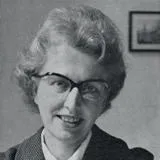Numerous King’s women have gone on to positively impact the world. For Women’s History Month, we are highlighting the stories of five women who had connections to King’s during their lifetimes. Carrying on from last year, we will be showcasing five different women in King’s history. Keep reading to learn more about their incredible contributions to history.
Virginia Woolf

Feminist writer Virginia Woold (1882-1941) was a student at King’s College London Ladies’ Department from 1897-1902. She studied Greek, Latin, German and History before going on to write famous works such as Mrs Dalloway, To the Lighthouse, Orlando and A Room of One’s Own.
Alongside her husband Leonard, she started the publishing house Hogarth Press, which initially operated with a hand press outside of their dining room. Woolf was also a key figure in the influential Bloomsbury Group.
You can visit the Virginia Woolf Building on the Strand Campus, where there is a life-sized waxwork model commissioned by artist Eleanor Cook.
Cicely Saunders

Dame Cicely Saunders (1918-2005) was a double alumna of GKT, studying both Nursing and Medicine. Dame Saunders is famous for revolutionising palliative care as a pioneer of the modern hospice movement, as well as establishing the first Institute for Palliative Care right here at King’s.
She originally studied Philosophy, Politics and Economics at Oxford university, however when the Second World War broke out Saunders left to train as a nurse
at St Thomas’ Hospital Nightingale School of Nursing, graduating in 1944. Dame Cicely briefly worked as a social worker (previously known as a hospital almoner), before returning to GKT, this time to train at the medical school as a doctor. She graduated in 1957 before going on to work at St Joseph’s Hospice in Hackney.
Dame Cicely’s vision was to create a comfortable and home-like environment where people at the end of their lives were offered a safe and caring environment that also provided medical care and symptom control. Thus, in 1967, St Christopher’s Hospice in Sydenham, Southeast London, was opened.
Saunders also set up The Cicely Saunders Foundation (renamed to Cicely Saunders International), to fund a centre for research and education in palliative care. In partnership with King’s, the world’s first purpose-built institute of palliative care was developed; giving research and training opportunities to healthcare professionals.
Dame Cicely was the recipient of 25 honorary degrees in her lifetime and published over 85 words translated worldwide. Her intellect and compassion mean that we now have modern hospices globally that look after the dying with care and kindness. She was made a DBE in 1980 and was given the order of merit in 1989.
Baroness Edith Summerskill

Baroness Edith Summerskill (1901-1980) was a doctor and politician who served in Clement Attlee’s post-war government. She studied medicine at King’s and qualified as a doctor at Charing Cross Hospital Medical School in 1924 as one of the first women to do so. Edith married another doctor, Jeffrey Samuel in 1925, however, did not take his name which was very unusual at the time. Their children also went by the surname of Summerskill. Throughout the 1930s Edith campaigned for the establishment of a National Health Service through the Socialist Medical Association. Edith was successfully elected as Labour Party MP for Fulham West in 1938. As a passionate feminist, in her first speech to the House of Commons, Edith said:
‘There is a saying that women are no good at figures, that they have no head for figures; but I am reminded that throughout this country in thousands of homes, the Chancellor of the Exchequer is a woman.’
Throughout her time in government, Edith served as Parliamentary Secretary to the Ministry of Food (1945–50) and as Minister of National Insurance (1950–51). She was also a member of the Labour Party's National Executive Committee and served as Chair of the Labour Party (1954-55). Edith left the House of Commons in 1961 and was made a life peer as Baroness Summerskill, of Kenwood, London. She was initiated into the Order of the Companions of Honour (CH) in 1966.
Dina Asher-Smith

Dina Asher-Smith (History, 2017) is a sprinter who holds British records in both the 100 and 200 metres. She came through the King’s Sport Performance Athlete programme, which supports student-athletes competing at an elite level.
Dina was born and raised in Orpington, London, and is a member of Blackheath and Bromley Harriers Athletic Club. She showed early promise as a sprinter, winning the English Schools Championships 200-metre title as an Under 15 (2010), Under 17 (2011) and Under 20 (2013) and taking home gold medals in the 200 metres and the 4x100 metre relay at the European Junior Championships in 2013.
Dina was the youngest athlete selected for Great Britain and Northern Ireland Squad at the 2013 World Championships in Moscow. She didn’t disappoint, helping the 4 x 100-metre relay team take home a bronze medal. One year later, she was celebrating the A-level results that gained her a place to study History at King’s.
With support from the university, Dina was able to continue progressing as an athlete whilst attaining her degree. Successes included becoming the fastest teenager in history at the 2015 World Championships, winning gold in the 200 metres at the 2016 European Championships, and medalling as part of the 4x100 metre relay team at the 2016 European Championships, the 2016 Olympics and the 2017 World Championships. In 2017 she also celebrated graduating from her history degree at King's.
In 2018 Dina achieved her greatest sprinting success to date, taking home a gold medal treble in the European Championships. She ran world-leading times in the 100 metres, 200 metres and 4 x 100-metre relay, the last alongside current King’s Psychology student Imani Lansiquot.
Helen Hudson

Dr Helen Hudson FKC (1919–2006) helped promote education for women and support students at King’s for over 20 years. Helen acquired her first post at King’s – Tutor for Women Students – in 1959 and used her position to fight for her female students’ welfare. She was often the only woman who sat on boards and committees, at a time when Professor Jean Hanson, Biophysics, was the only female professor at King’s.
She helped female students secure safe accommodations during their studies after the women’s hall in Kensington was sold off. And Helen successfully argued for the male students’ Halliday Hall to become a mixed hall, despite being hissed at by the men when first joining them to dine there. In her role on the admissions board, Helen worked to increase the number of King’s College School of Medicine female admissions, which originally had a quota of just 10. During her time there, she interviewed every female student applying to King’s, making a point to judge them on their merits rather than gender.
Helen dedicated herself to King’s for over 20 years and was particularly passionate about the Chapel and its music. She became Dean of Students in 1973, a position that she held until 1982. She left a legacy that funds two King’s Choral and Organ scholarships for women each year.
Women’s History Month is from the 1st to the 31st of March. See more about the events and initiatives we’re running to mark the month here.